Chinese-learning Iranian students keen to promote Chinese culture
Xinhua | Updated: 2023-11-30 14:08

Any visitor to the Chinese Culture Week being held at the University of Tehran would be amazed by the Chinese tea, food, and various artworks produced through Chinese knotting and traditional paper cutting -- all displayed by Iranian students learning Chinese.
"Chinese knots are believed to bring good luck and act as charms that can ward off evil spirits," Zeinab Ghafourian, a 19-year-old sophomore studying Chinese at the Confucius Institute of the University of Tehran, told Xinhua on Tuesday.
The Chinese Culture Week, which started at the institute last Saturday and will last till Wednesday, aims to introduce Chinese culture to more Iranians.
Held inside the lobby of the institute, which was established in 2009, the event displayed a range of artworks that contain different elements of Chinese culture, produced by Iranian professors and students at the university.
On the reasons why she chose to study the Chinese language, Ghafourian said that she has been interested in East Asian cultures even since childhood. "In addition, the Chinese films have become more and more popular," she said.
More importantly, given Iran's good ties with China, mastering the Chinese language "offers better employment prospects" in the Iranian job market compared to other languages, she explained.
Mohammadreza Gholamrezaei, another sophomore at the institute, also said he chose to learn the Chinese language due to his strong interest in China's rich culture and history.
Noting that the Iranian and Chinese people enjoy many cultural commonalities, as they have been connected through cultural and economic exchanges via the ancient Silk Road in the long past.
"Given China's increasing global influence, as well as its friendly and expanded relations with Iran, learning about the country unmediated becoming very important," said Hamed Vafaei, the Iranian director of the Confucius Institute at the University of Tehran.
He believed that the students who are studying Chinese language at the institute would enter different sectors of Iranian society in the near future, helping more people to get to know more about China.
China is the world's second-largest economy, the most populous country, and a permanent member of the UN Security Council, so learning the Chinese language has become a necessity as many around the world have realized, he said.
"In addition, Iran needs to know its counterparts, one of the most important ones is China," Vafaei said, noting that Iran and China have built strong political, economic and cultural relations.
"Each of the students here is a window toward China, helping the Iranian people have a more realistic picture of the country, which will help improve bilateral relations," he added.
























